In light of the devastating Easter Sunday Islamist terrorist attacks in Sri Lanka, one particular feature drew the attention of many: the background of the assailants.
These were by no means economically deprived individuals languishing in the lower rungs of the Sir Lankan economy. The general socio-demographic profile of terrorists behind this well-planned, co-ordinated series of attacks is one of affluence and high social status – well-educated men hailing from middle-class families, if not higher. Indeed, two of the terrorists were sons of Mohamed Ibrahim – a wealthy spice trader and pillar of the community.
This has inevitably re-ignited a long-running debate over the relationship between poverty and terrorism.
Following the 9/11 terrorist attacks, many of the world’s leaders identified poverty and economic deprivation as critically important causes of terrorist activity (which is interesting, when one considers the immensely wealthy background of its mastermind, Osama Bin Laden, along with assailants such as Mohamed Atta and Ziad Jarrah).
Former US President George W. Bush claimed that the global community should strive to eradicate poverty as “hope is the answer to terror.” James Wolfensohn, former President of the World Bank, confidently advanced the view that “we won’t win the war against terror without addressing the problem of poverty.” These sentiments were shared by former UK Chancellor of the Exchequer and later Prime Minister Gordon Brown.
However, close inspection of recent terrorist attacks — including the Easter Sunday suicide bombings in Sri Lanka — finds that perpetrators often come from relatively affluent and well-resourced backgrounds, creating doubt over the credibility of the “poverty-terrorism nexus.” Studies which analyse fluctuations in global poverty in relation with the incidence of transnational terrorist attacks, have found that international terrorist activity is by no means in sync with global poverty rates.
So, the poverty-terrorism nexus appears to be a discredited concept. But does this mean we should completely dismiss any argument which suggests that poverty may be implicated in extremism and terrorist activity?
Not necessarily. It is important to acknowledge that studies based on broad global poverty and terrorism trends do not quite represent a sophisticated account of things. And those working to prevent more devastating attacks like those in Sri Lanka must go beyond straightforward causality between poverty and terrorism.
There is a wealth of research which finds that relatively socio-economically disadvantaged ethnic minorities in Western societies – such as the UK’s sizeable Pakistani and Bangladeshi Muslim communities – tend to be more socially “segregated” from the mainstream. This very much suggests that economic deprivation is closely associated with social, economic and residential forms of segregation.
This insular state, where deprived groups with relatively high levels of poverty reside in ethnic enclaves are cut off for the mainstream, is hugely undesirable from a counter-extremism perspective. Social segregation means there are reduced opportunities for positive forms of inter-group contact which could help to develop cross-community bonds of familiarity, mutual regard and trust.
With segregation breeding suspicion of the unknown and limiting opportunities for positive contact outside of one’s own group, individuals may be more vulnerable to extremist influences which peddle deliberately divisive narratives based on negative stereotypes and sweeping generalisations made of the “other.” In this sense, economic deprivation is linked with forms of social segregation which may be associated with the growth of militant extremist ideologies. With poverty often being associated with social exclusion, it is also important to understand how extremist organisations may exploit isolated individuals by offering them a sense of belonging.
Another point to raise is self-perceptions of why one is living in poverty, and whether this is associated with feelings of relative deprivation – perceived unequal treatment based on one’s racial, ethnic or religious identity. Living in poverty but not perceiving this to be the result of systematic discrimination is quite different to attributing it to group-specific mistreatment at the hands of the state and private business. Those who fall into the second category of poverty may be more susceptible to extremist, grievance-driven narratives when compared to the former. While these groups may both be poverty-stricken, their understanding of their own economic difficulties and perceptions of their broader socio-political environment may differ vastly.
Simplistic narratives are peddled by both sides of the poverty-terrorism debate. There are those who argue that the eradication of poverty and global broad-based prosperity will act as a “magic bullet” and solve international terrorism. Then on the opposing side are those who completely discount any possibility of economic deprivation being implicated in the growth of extremism of terrorist activity.
The sweet spot is understanding the need to broaden our understanding of the poverty-terrorism nexus. This includes how precarious economic conditions are related to other societal and socio-political matters which may be associated with a higher likelihood of falling under extremist influences and participating in acts of terrorism. By adopting a more nuanced understanding of the relationship between poverty and terrorism, we will be able to develop more effective counter-extremist strategies.
CapX depends on the generosity of its readers. If you value what we do, please consider making a donation.


